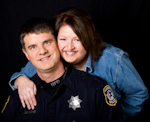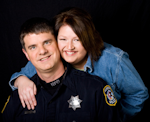Coupling Up for Young Cops: Questions and Challenges
No one truly prepares us for a lifelong romantic relationship, yet most of us desire and search for THE ONE at some point, or will manage to bumble into a relationship with someone we ultimately decide is our forever person. What preparation we do have often consists of observing other couples – parents or other relatives, friends, siblings – to draw from their experience and example. Perhaps advice will be actively sought or offered, and ideally that advice will come from happy couples who are exemplars of how best to do life together. There is something to be said for this kind of life “training,” and those who follow the lead of relationally skilled couples do have greater success when it is their time.
But even following good examples may not be enough, especially early on. It’s said you’ll have to kiss a lot of frogs to find your prince (or princess), and most people do, but few of us consider the possibility we may be someone else’s frog, or how to move past our inner amphibian to be successful in the relationship game. Most of our early relationships fail on some level before we land on the one we believe will last a lifetime, and then divorce is still a reality for a significant percentage over time. Add into the mix one or more of the partners working in law enforcement and the strains on marriage are intensified. Even among relationships that do hold together there are a many that leave one or both partners crushed emotionally. It turns out being committed to one person for the rest of your life sounds good on paper but, for many, it is a recipe for heartache. You see, no one truly prepares us for a lifelong romantic relationship.
So why do we couple up?
We’re not sure we really know and theories run the gamut. Some see coupling as an evolutionary adaptation, fulfilling biological drives to successfully procreate and to alleviate anxiety tied to mate competition and uncertainty. Others sidestep into belief it is a social construct created to serve (take your pick) religion, patriarchal control, survival of women and offspring in harsh conditions, family lineage, or to counter polygamy, in which older, wealthier, high status men collect many wives to the detriment of young, lower status men (believed by some to weaken and destabilize polygamous societies). Yet others even suggest no one should ever be monogamous, believing permanent coupling is antithetical to either human evolutionary and historical evidence, or an outdated relational paradigm increasingly negated by cultural and biological changes. Still, most of us know we’ve had the desire to pair even since childhood and that it seems to be an intrinsic drive. We usually start this pursuit once we hit puberty with the desire to begin dating in hopes of finding THE ONE.
This desire to find our one perfect partner for life usually intensifies as we long to start lives separate from our parents. For most of us, this means creating our own differentiated identity; we desire to leave our mark, to build our own home and space, perhaps to raise kids and pets, and to find our ride or die. Humans are social creatures driven to relationships and stability, and coupling is stabilizing when done right.
But why do so many relationships fail?
Most couples marry after an initial courtship, having fallen in love and decided to spend the rest of their lives together. Earnest oaths are spoken in front of family and friends about sticking together through good times and bad, sickness and health, financial ups and downs, and all the troubles life will throw their way, all while vowing to love, honor, and cherish one another every day and in every moment. Others may not marry, content to follow their own path to fulfillment but every bit as committed to doing life together to the end. They know relationships can be challenging and that the giddy idealism of early love will give way to day-to-day realities, and all relationships eventually face tough times, but somehow believe simply being in love should be enough to get through it all.
Yeaaa… about that. Many never truly understand that marriage is the hardest relationship in which they will ever be involved, and its survival requires acute awareness of relationship danger zones. Many underestimate or choose to ignore the reality that a new life with their “perfect” partner requires hard work and a lot of forgiveness of overlooked or yet-to-be-discovered imperfections, or the reality of the impact of their own imperfections. For cops and their partners, add the peculiar stresses of law enforcement both on the job and off, the shift work and missed holidays, the common feeling of being a “married single,” and how policing not only draws certain types but can also shape them and their personality in ways that would challenge even the strongest bonds.
And then, as with many couples, complacency sets in.
There’s an old cop joke that by the second or third marriage, most cops actually get it right! The trick, then, is to work as long as possible and outlive as many exes as possible to enjoy the full benefits of their pension. There’s plenty of cynicism in that statement, but quite a lot of truth, too.
So what it takes to make it work?
As we’ve been writing lately about the next generations of officers to hit the streets, we will be focused on providing evidence-based advice to them. In our next article, we will address what research and experience suggests they will need to succeed in the relationships they are forming as their careers launch, as well as how to protect existing relationships when the realities of a LEO lifestyle challenge them.

Michael Wasilewski
Althea Olson, LCSW and Mike Wasilewski, MSW have been married since 1994. Mike works full-time as a police officer for a large suburban Chicago agency while Althea is a social worker in private practice in Joliet & Naperville, IL. They have been popular contributors of Officer.com since 2007 writing on a wide range of topics to include officer wellness, relationships, mental health, morale, and ethics. Their writing led to them developing More Than A Cop, and traveling the country as trainers teaching “survival skills off the street.” They can be contacted at [email protected] and can be followed on Facebook or Twitter at More Than A Cop, or check out their website www.MoreThanACop.com.

Althea Olson
Althea Olson, LCSW and Mike Wasilewski, MSW have been married since 1994. Mike works full-time as a police officer for a large suburban Chicago agency while Althea is a social worker in private practice in Joliet & Naperville, IL. They have been popular contributors of Officer.com since 2007 writing on a wide range of topics to include officer wellness, relationships, mental health, morale, and ethics. Their writing led to them developing More Than A Cop, and traveling the country as trainers teaching “survival skills off the street.” They can be contacted at [email protected] and can be followed on Facebook or Twitter at More Than A Cop, or check out their website www.MoreThanACop.com.


